Skills and experience are crucial in hiring, but they are only part of the equation. Other factors, such as cultural fit and personal attributes, also play a significant role in making the right choice. While a candidate may look impressive on a resume, yet their personality clashes with your company culture or the demand of the specific job role. The outcome? It can lead to challenges that disrupt the workplace. That’s where Personality Assessment Tests come into play. These tests dig deeper than resumes and interviews, offering insights into how candidates think, behave, and interact. Essentially, they serve as a guide to help you hire someone who not only gets the job done but does so seamlessly in your unique work environment. Let’s explore the 10 best personality assessment tests and how they help you pinpoint the perfect match for your job roles.
Table of Contents
What are Personality Assessment Tests?
Personality assessment tests are the tools used to evaluate the behavioral traits, attitudes, and emotional tendencies of candidates. These tests provide insights into how candidates might behave in various work environments, which is important for determining whether they fit well with a company’s culture and job requirements. By measuring qualities such as emotional intelligence, teamwork, leadership potential, and adaptability, personality tests help employers predict how candidates will perform in specific roles.
These assessments are valuable because they go beyond technical skills and qualifications. They focus on the underlying personality traits that drive decision-making, interaction with colleagues, and overall job performance. In addition, Personality assessment tests can help reduce bias in recruitment by providing objective data that complements interviews and resumes.
Moreover, the results of these tests enable recruiters to identify candidates who align with the company’s values and work style. As a result, the risk of high employee turnover can be minimized, improving overall employee retention. Furthermore, personality assessments can enhance the efficiency of the hiring process by streamlining candidate selection and ensuring that the chosen candidates are not only skilled but also well-suited for the organizational environment.
10 Best Personality Assessment Tests
1. Xobin Online Psychometric Testing
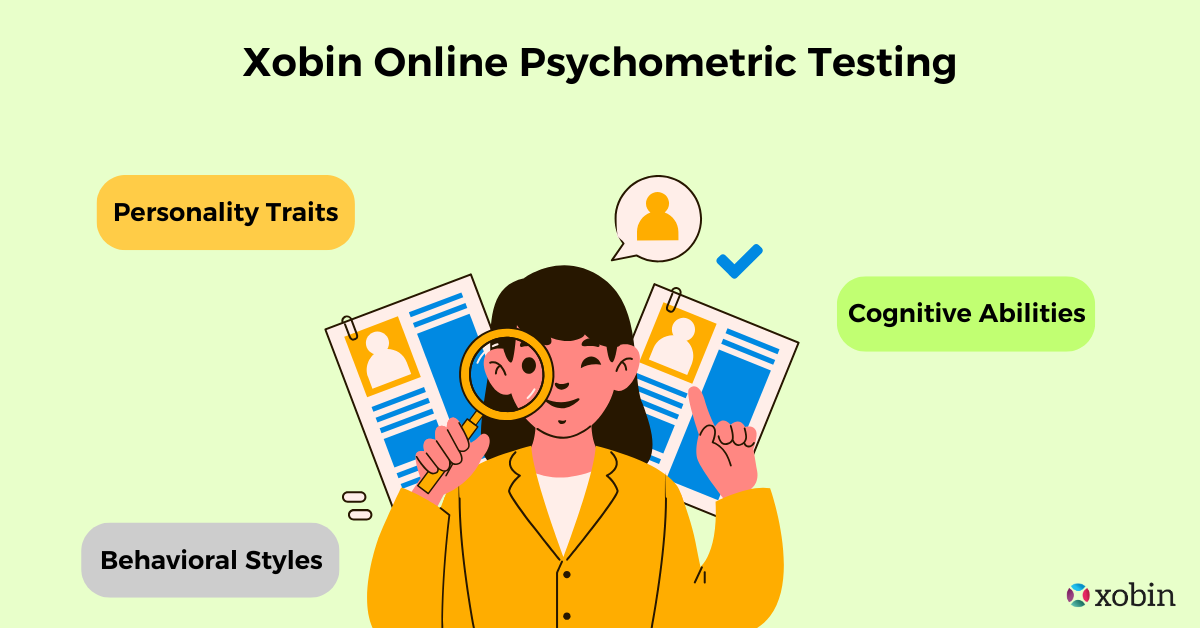
Xobin’s Online Psychometric Testing goes beyond assessing skills; it evaluates the personality traits of candidates to ensure a perfect fit for your team and the role. These assessments are validated with psychometric properties and provide employers with insights into how a candidate’s personality aligns with team dynamics and job requirements. The test measures various traits, including cognitive abilities, behavioral styles, and emotional intelligence. This comprehensive analysis helps you hire candidates who are not only qualified but also a cultural fit for your organization.
One standout feature of Xobin’s Psychometric Testing Software is its adaptability. The assessment can be customized to suit specific job roles and organizational goals. Whether you’re recruiting for leadership roles or creative positions, the test delivers actionable insights into candidates’ personalities, ensuring optimal hiring decisions.
By evaluating key factors such as emotional intelligence, problem-solving abilities, and interpersonal skills, Xobin’s test becomes an indispensable tool for predicting job performance. Additionally, the platform generates detailed reports, enabling recruiters to make informed and confident hiring choices.
Why is it useful?
- It combines psychological theory with data analytics.
- Helps predict workplace behavior accurately.
- Provides easy-to-read reports for quick decision-making.
Best for Companies looking for a comprehensive talent assessment to evaluate candidates for relevant job roles and specific skills that includes personality insights.
2. 16 Personality Types Test
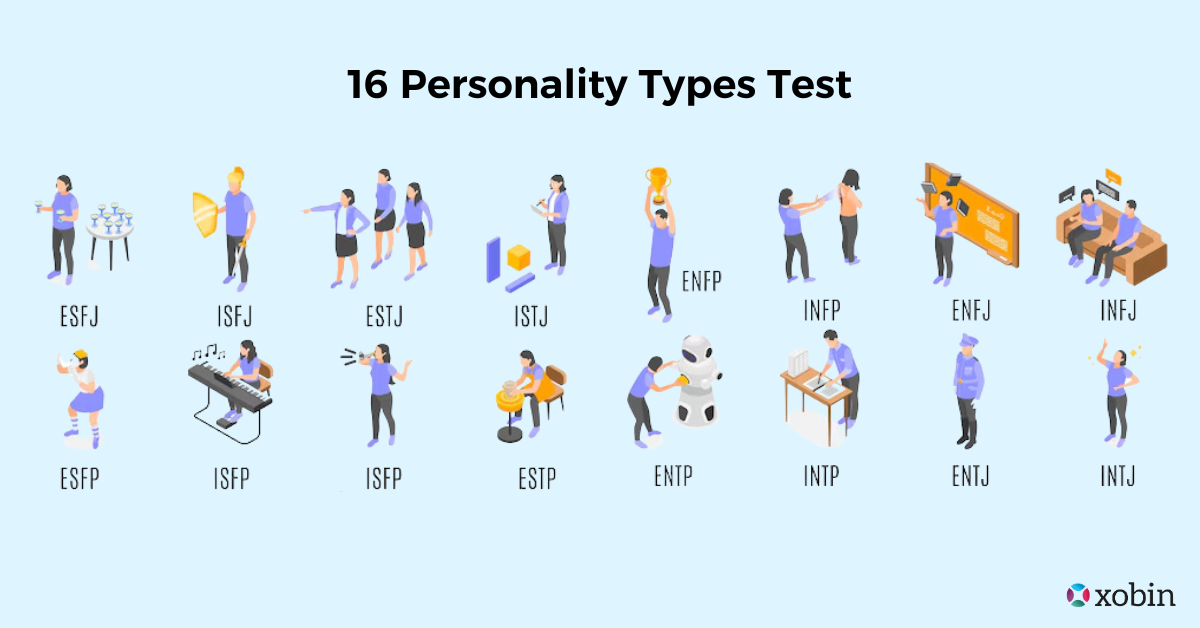
You’ve likely heard of the Myers-Briggs Type Indicator (MBTI), a well-known personality assessment. The 16 Personality Types Test, a modern variation of this classic, is based on Carl Jung’s psychological theories. This test focuses on an individual’s preferences in areas like perception, decision-making, and approach to life. By assessing traits such as introversion, extroversion, thinking, and feeling, it categorizes candidates into one of 16 distinct personality types. Quick and engaging, this test offers valuable insights into strengths, weaknesses, and interpersonal skills, providing detailed results that are easy to understand and apply.
Recruiters use this test to assess how candidates communicate, handle stress and solve problems. For example, a person with an “ENTJ” type might excel in leadership roles, while someone who’s “ISFP” may thrive in creative environments.
Why is it useful?
- It’s easy to interpret and implement.
- Provides a detailed personality profile for each candidate.
- Helps in assigning roles that align with candidates’ natural strengths.
3. The Myers-Briggs Type Indicator (MBTI)
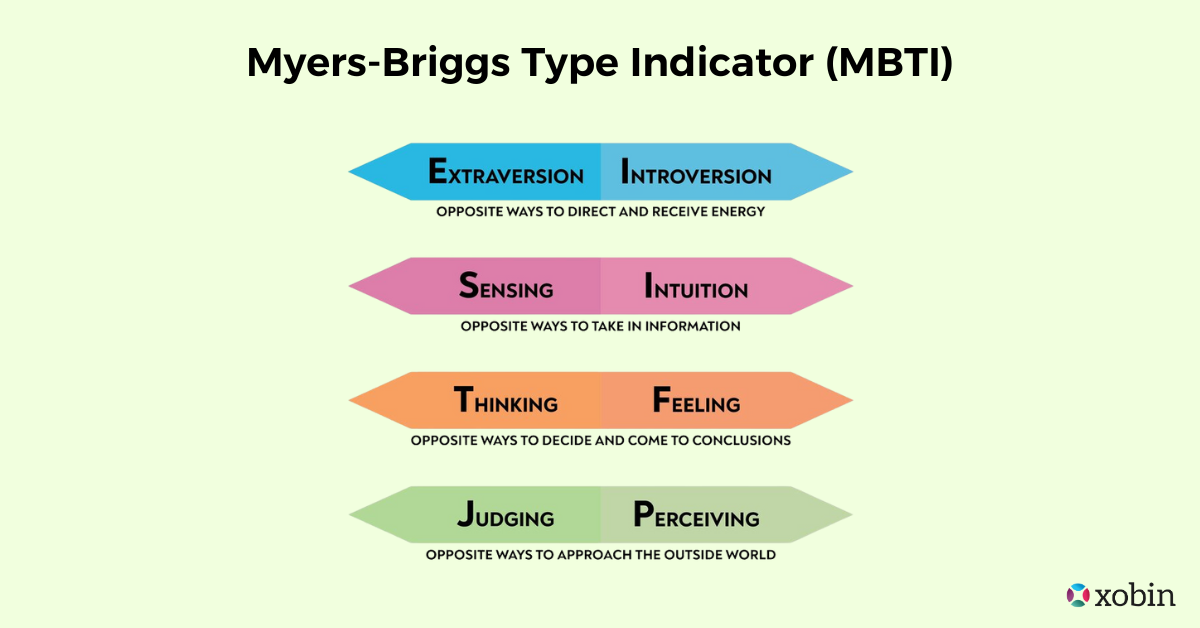
The MBTI is one of the most popular Personality Assessment Tests in the world. It classifies individuals into 16 personality types, using four key dichotomies for categorization.
- Extraversion vs. Introversion (E vs. I)
- Sensing vs. Intuition (S vs. N)
- Thinking vs. Feeling (T vs. F)
- Judging vs. Perceiving (J vs. P)
By understanding an individual’s preferences, MBTI helps recruiters determine if a candidate’s personality is well-suited to the specific demands of a role. For example, an extroverted candidate may perform better in client-facing roles, while an introverted person might excel in research or technical positions.
Why is it useful?
The MBTI provides a deeper understanding of how individuals process information, make decisions, and interact with others.
Best For roles requiring teamwork or strategic planning and fostering better workplace communication.
4. DISC Test
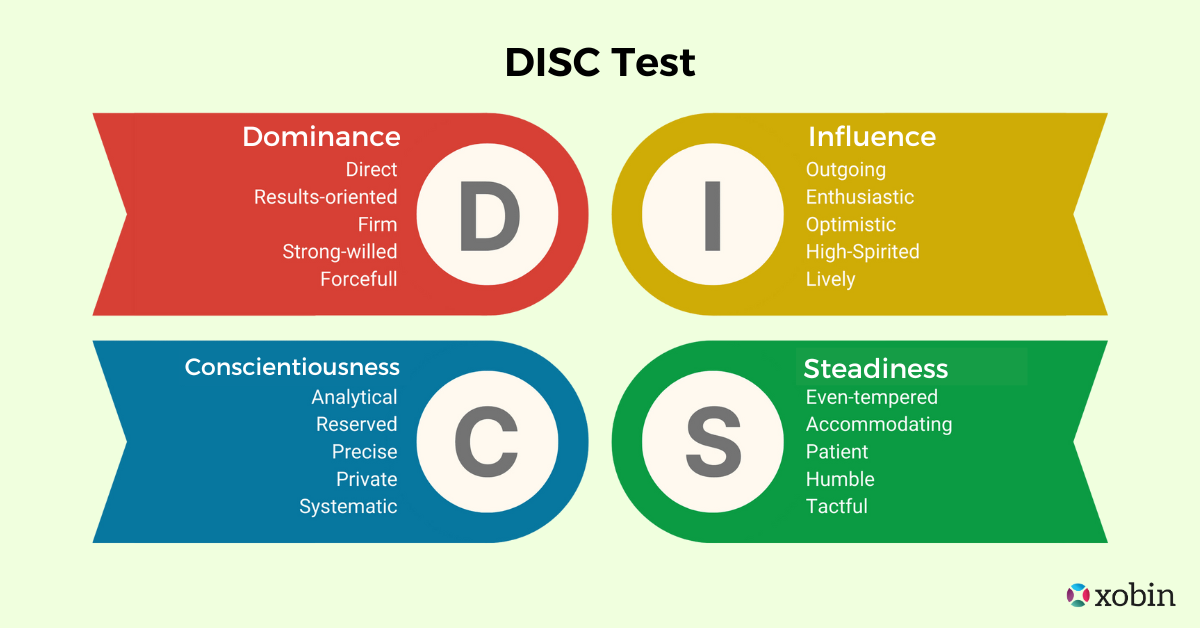
The DISC personality assessment test focuses on four behavioral traits:
- Dominance (D): Leadership and control.
- Influence (I): Communication and enthusiasm.
- Steadiness (S): Patience and reliability.
- Conscientiousness (C): Precision and accuracy.
Organizations widely use the DISC test to evaluate how individuals communicate and collaborate within teams. It provides valuable insights into how candidates are likely to interact with others in the workplace. For instance, individuals with high Dominance scores often excel in decision-making roles, while those scoring high in Influence demonstrate exceptional interpersonal skills. This makes the DISC test an ideal tool for identifying leadership potential.
Additionally, it proves especially beneficial when assessing candidates for sales roles or any position that demands strong interpersonal abilities. By leveraging the DISC test, organizations can ensure their teams work more cohesively and effectively.
Why is it useful?
- Offers actionable insights into communication styles.
- Enhances team-building efforts.
- Helps in conflict resolution by understanding diverse personalities.
Best For analyzing communication styles and leadership potential.
5. Big 5 (OCEAN) Traits Test
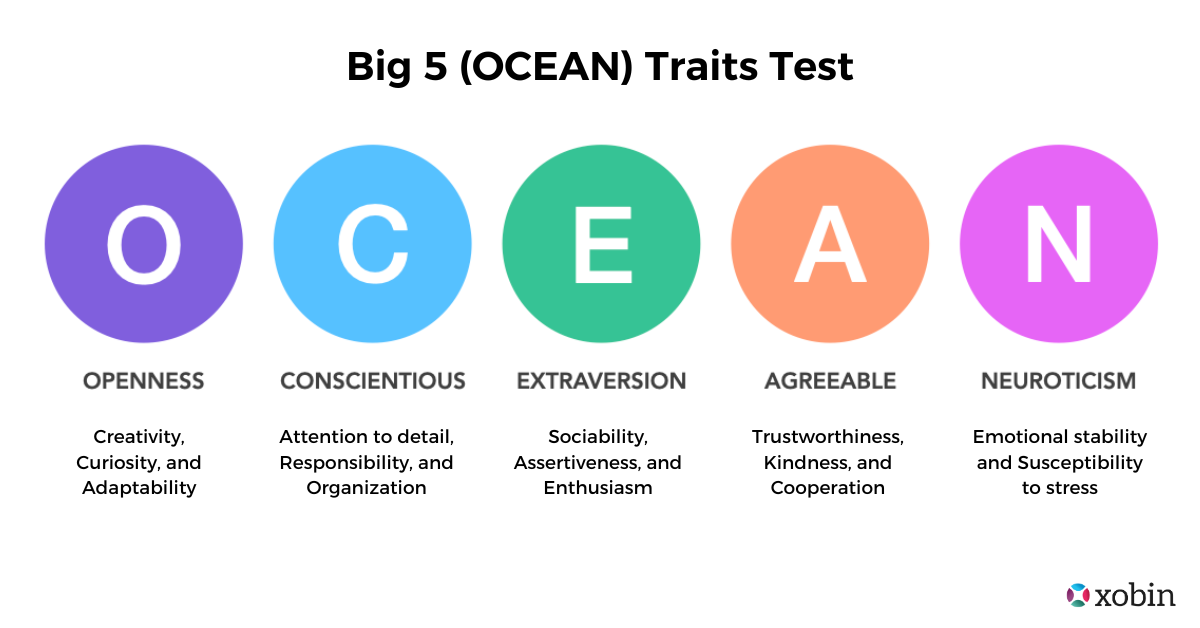
The Big Five Personality Traits Test, also known as OCEAN, is a favorite among psychologists and recruiters alike. It evaluates individuals based on five key dimensions:
- Openness to experience: Creativity, curiosity, and adaptability.
- Conscientiousness: Attention to detail, responsibility, and organization
- Extraversion: Sociability, assertiveness, and enthusiasm
- Agreeableness: Trustworthiness, kindness, and cooperation
- Neuroticism: Emotional stability and susceptibility to stress
The Big 5 model is scientifically validated personality frameworks and is widely used in recruitment. Its focus on traits such as Conscientiousness and emotional stability makes it especially useful for predicting job performance.
This test is ideal for predicting job performance and cultural fit. For instance, a high score in Conscientiousness suggests the candidate is detail-oriented and reliable—perfect for roles requiring precision. Meanwhile, high Extraversion may indicate suitability for customer-facing or sales roles.
Why is it useful?
- Scientifically validated and widely used.
- Provides nuanced insights into personality.
- Helps in building well-rounded teams.
Best For roles requiring teamwork, creativity, or resilience.
6. HEXACO Personality Inventory
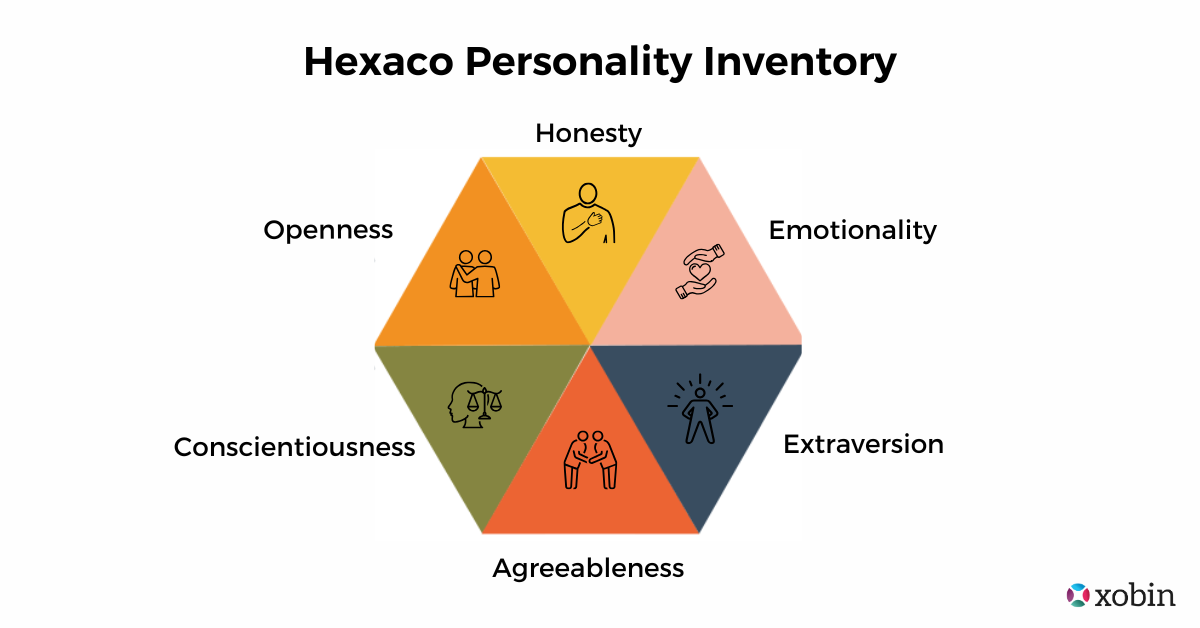
The HEXACO Personality Inventory expands on the Big 5 model by introducing an additional trait – Honesty-Humility. This test measures six key dimensions:
- Honesty-Humility: Integrity, fairness, and modesty
- Emotionality: Sensitivity to stress and emotional experiences
- Extraversion: Sociability and enthusiasm
- Agreeableness: Cooperative and empathetic tendencies
- Conscientiousness: Organization and goal-orientation
- Openness to Experience: Creativity and curiosity
This unique factor evaluates an individual’s inclination towards fairness, sincerity, and humility. It is especially valuable for roles where integrity and ethical behavior are paramount. By offering a comprehensive analysis, the HEXACO Test provides valuable insights into how candidates approach both relationships and responsibilities.
Why is it useful?
This test provides a deep dive into how candidates approach relationships and responsibilities.
Best For roles where traits like ethical behavior, trustworthiness, and integrity are essential.
7. Hogan Personality Inventory (HPI)
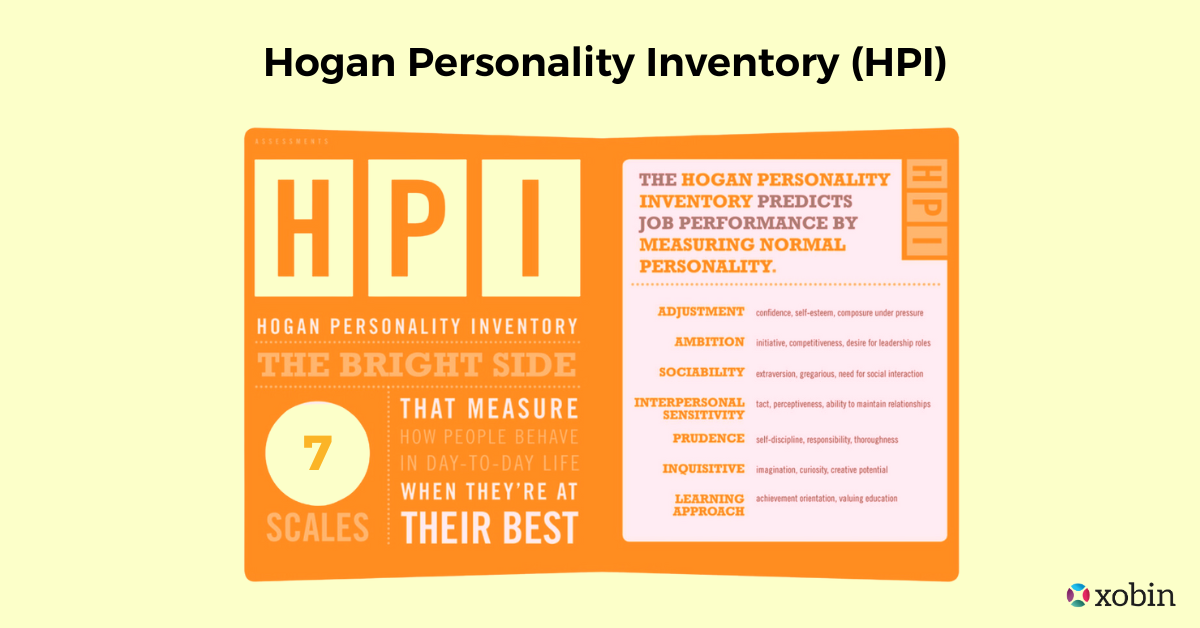
The Hogan Personality Inventory (HPI) is a comprehensive personality assessment that helps predict job performance and leadership potential. It evaluates how a candidate’s personality traits may impact their behavior in the workplace, particularly under stress or high-pressure situations.
Widely recognized for its focus on workplace dynamics, the HPI measures key personality characteristics such as ambition, sociability, and prudence, which play a significant role in career success and relationship management. If your goal is to assess how a candidate will handle workplace stress, adapt to team environments, or advance in their career, this test is highly valuable.
Why is it useful?
It’s particularly effective for identifying leadership potential and predicting future job performance.
Best For: roles that demand strong leadership qualities and customer-facing skills.
8. Caliper Profile
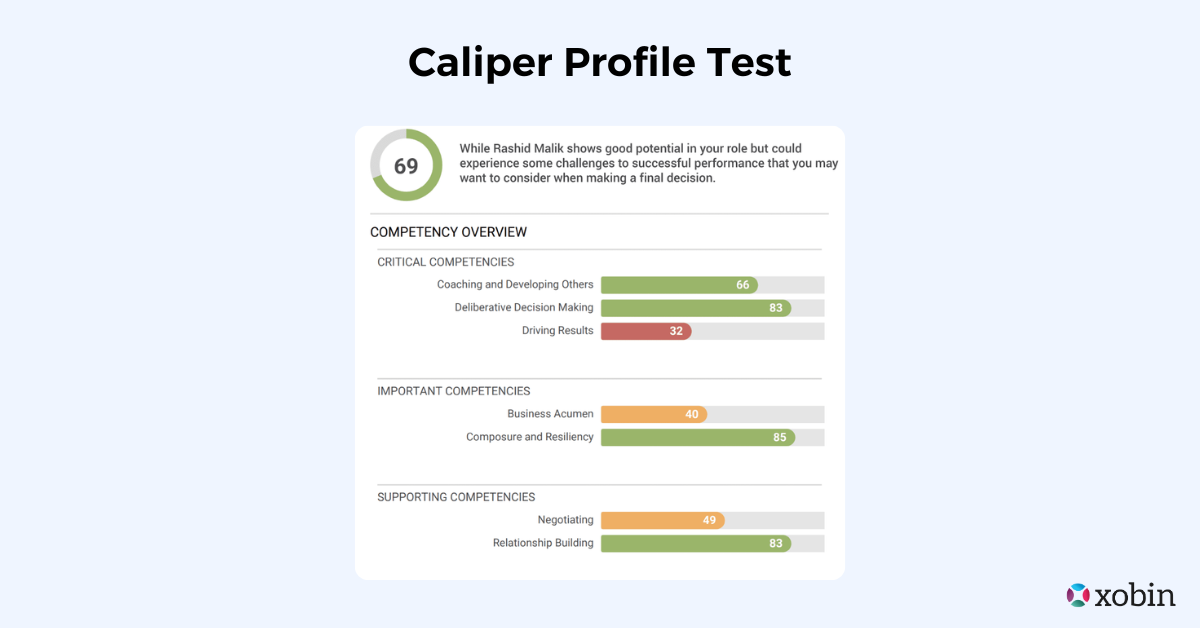
The Caliper Profile is a comprehensive personality assessment test designed to evaluate a candidate’s cognitive abilities, behavior, and motivation. It provides valuable insights into how well an individual will integrate into a team and manage specific job responsibilities. This makes it particularly useful for employers seeking a deeper understanding of a candidate’s potential fit.
The assessment measures 22 distinct personality traits, such as assertiveness, decision-making, and stress tolerance. These traits are directly correlated with job performance, especially in high-pressure environments or client-facing roles. By examining these attributes, the Caliper Profile offers a detailed behavioral report, which aids hiring managers in making data-driven decisions.
What sets the Caliper Profile apart is its emphasis on actionable insights that can be used for coaching and development. Employers gain a clear picture of a candidate’s potential to thrive in a particular role and their alignment with the company’s long-term objectives. This makes the Caliper Profile an essential tool for enhancing hiring decisions and fostering growth within an organization.
Why is it useful?
By linking personality traits to job requirements, this test helps employers pinpoint the best candidates for high-stakes positions.
Best For sales roles, leadership positions, and high-performance teams.
9. Enneagram Personality Test
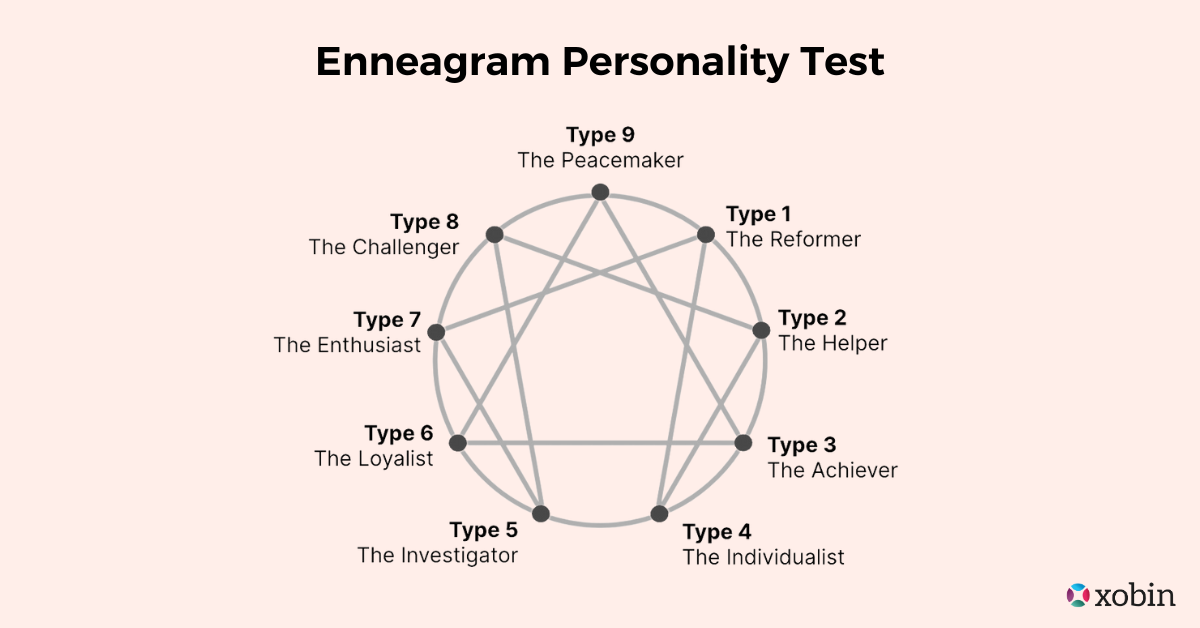
The Enneagram Personality Test classifies individuals into nine distinct personality types, each with its own set of motivations, fears, and behaviors. The nine types are:
- Type 1 The Reformer
- Type 2 The Helper
- Type 3 The Achiever
- Type 4 The Individualist
- Type 5 The Investigator
- Type 6 The Loyalist
- Type 7 The Enthusiast
- Type 8 The Challenger
- Type 9 The Peacemaker
Understanding different personality types is crucial for recruiters in making informed decisions about how candidates will fit into an organization’s culture and team dynamics. By using this test, recruiters gain valuable insights into the deeper psychological aspects of a candidate’s behavior, which can significantly impact their performance in a given role.
Ultimately, this test provides recruiters with a clearer understanding of candidates’ core motivations, allowing them to make better hiring decisions that align with organizational needs.
Why is it useful?
It’s fantastic for team building, as it helps identify complementary personalities and potential conflicts.
Best For roles that require emotional intelligence or strong interpersonal skills.
10. CliftonStrengths Assessment
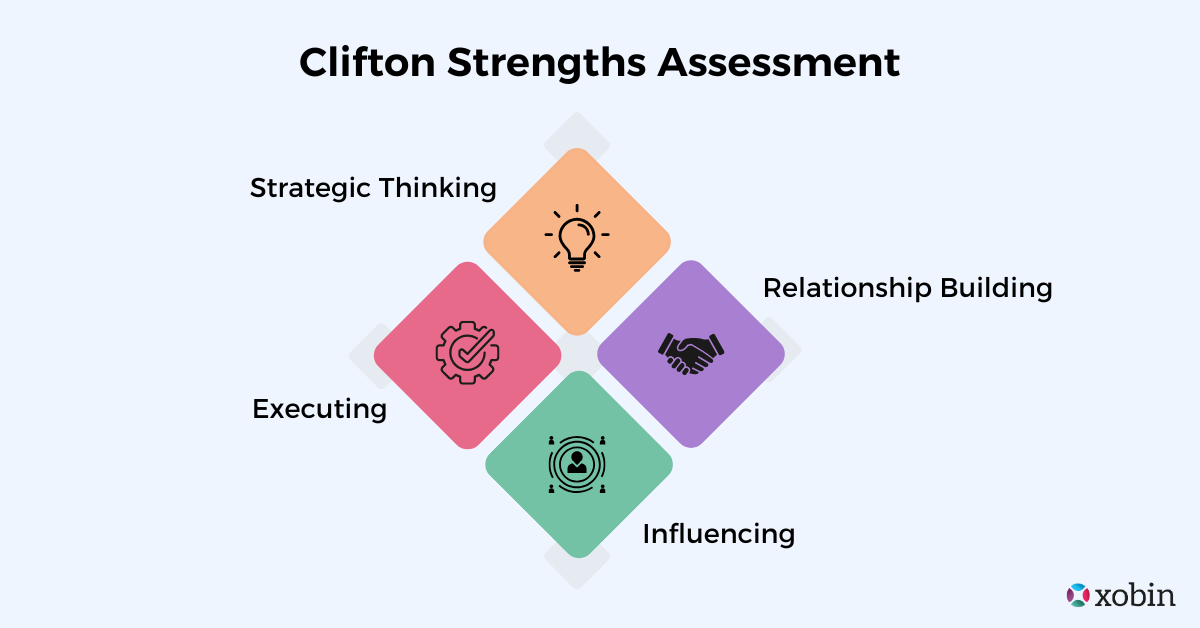
The CliftonStrengths assessment, formerly known as StrengthsFinder, is designed to uncover a candidate’s natural strengths and talents. This valuable tool helps individuals gain a deeper understanding of their unique abilities, enabling them to leverage them effectively in the workplace. Notably, it is especially useful for identifying the best fit for roles that demand specific skills, such as sales or creative positions.
CliftonStrengths identifies 34 distinct strengths, grouped into four key areas: strategic thinking, relationship building, influencing, and executing. By concentrating on these strengths, the assessment empowers organizations to align a candidate’s talents with the specific demands of a role. This alignment ensures that candidates are placed in positions where they can thrive and contribute meaningfully to the organization’s success.
Focusing on strengths allows employers to see how a candidate’s abilities fit within the context of the job. For instance, if a role requires creative problem-solving, individuals with strengths in strategic thinking and ideation will likely excel. On the other hand, positions that demand strong relationship-building skills, such as sales or HR, are better suited for candidates who possess strengths in communication and empathy.
Why is it useful?
It focuses on strengths and aligns a candidate’s talents with the specific demands of a role.
Best for roles that demand specific skills.
Conclusion
Incorporating personality assessment tests into your hiring process will not only help you find the best-fit candidates but also enhance your employer branding by showing that your company values thoughtful, comprehensive, and accurate hiring practices. So, why wait? Start using these powerful personality assessment tests today and watch your hiring process transform!
Ready to take the next step? Book a Personalized Demo today to Get Started.






